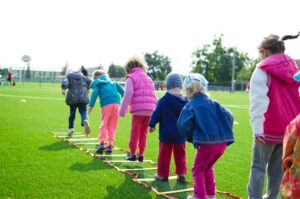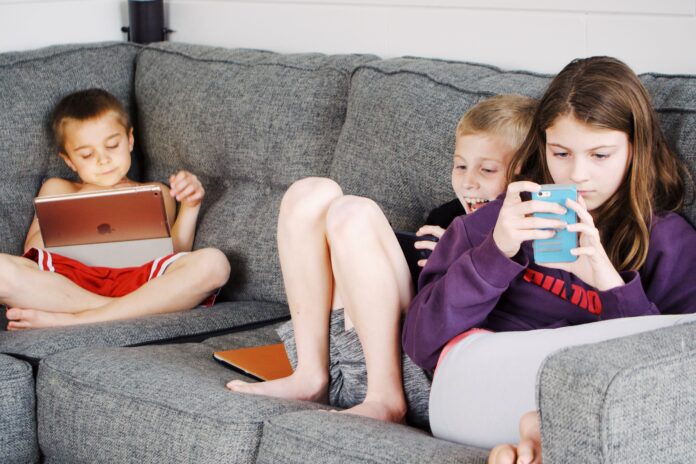The Dark Side of Social Media: How it Impacts Children’s Education, Social Development, and Mental Health
Social media has revolutionized the way we communicate with each other. It has become an integral part of our daily lives, especially for children and teenagers. While social media has many benefits like staying in touch with friends and family, sharing information, and networking, it also has a dark side. Overuse of social media can have a significant impact on children’s education, social development, and mental health. As a result, parents and educators alike are concerned about the effects that social media is having on young people. In this post, we will examine the negative impact of social media on children’s education, social development, and mental health. We will also provide some tips on how parents and educators can help children use social media in a safe and healthy way, without negatively impacting their overall well-being.
1. Introduction: The pervasive influence of social media in children’s lives
Social media has become an integral part of our daily lives, permeating every aspect of our society. From connecting with friends and family, to sharing experiences and opinions, it has revolutionized the way we communicate. However, as with any technological advancement, there are always two sides to the coin.
In recent years, the impact of social media on children has become a topic of concern. With the rise of smartphones and easy access to various platforms, children are increasingly exposed to the world of social media at a young age. They are constantly bombarded with a plethora of information, from viral challenges to curated lifestyles of influencers and celebrities.
The influence of social media on children’s education cannot be ignored. While it offers a vast pool of knowledge and educational resources, it also poses distractions and hampers their ability to focus. The constant need for validation through likes and comments can lead to a decrease in productivity, as children spend more time seeking online approval rather than focusing on their studies.
Furthermore, social media’s impact on children’s social development is a double-edged sword. On one hand, it provides a platform for children to connect with peers, share common interests, and develop friendships. On the other hand, it can lead to a skewed perception of reality, as children compare themselves to carefully curated profiles and strive for unattainable standards of beauty and success. This can result in feelings of inadequacy, low self-esteem, and social anxiety.
Mental health is another area where the dark side of social media manifests itself. Cyberbullying, online harassment, and the constant pressure to maintain a perfect online persona can take a toll on a child’s mental well-being. The fear of missing out (FOMO) and the addictive nature of social media can also contribute to anxiety, depression, and sleep disturbances.
In this blog post, we will delve deeper into the various ways social media impacts children’s education, social development, and mental health. By understanding the challenges and potential risks associated with social media, we can take steps to mitigate its negative effects and create a healthier digital environment for our children.

2. Educational impact: How social media distracts students and affects their academic performance
The rise of social media has undoubtedly revolutionized the way we communicate, connect, and share information. However, it’s important to acknowledge the dark side of this technological advancement, particularly when it comes to its impact on children’s education.
One of the most significant concerns regarding social media’s influence on students is its potential to distract them from their academic pursuits. With the constant allure of notifications, likes, comments, and shares, it’s no surprise that students often find themselves succumbing to the temptation of checking their social media accounts during study time.
This constant distraction can have a detrimental effect on their ability to concentrate, retain information, and perform well academically. Research has shown that excessive social media use can lead to decreased productivity, poor time management, and lower grades. The temptation to constantly stay connected and be up to date with what’s happening in the virtual world can divert their attention away from their studies and hinder their overall academic performance.
Moreover, social media platforms are filled with an abundance of content that may not always be reliable or educational. Students can easily get sidetracked by the plethora of videos, memes, and posts that offer little to no educational value. Instead of focusing on their assignments or studying, they may find themselves engrossed in mindless scrolling or engaging in online discussions that add little to their intellectual growth.
It’s crucial for parents, educators, and society as a whole to address this issue seriously. Encouraging students to develop healthy digital habits, such as setting designated study periods free from social media distractions, can significantly mitigate the negative impact on their education. Additionally, fostering a culture that promotes critical thinking and discernment when consuming online content can help students differentiate between valuable educational resources and time-wasting distractions.
By recognizing and addressing the educational impact of social media on students, we can strive to strike a balance between the benefits and perils of this digital era. It’s essential to empower students to make conscious choices about their online activities, enabling them to prioritize their education while still enjoying the benefits of social media in a responsible and controlled manner.

3. Social development: The potential negative effects of social media on children’s social skills and relationships
Social media has become an integral part of our lives, but its impact on children’s social development cannot be overlooked. While social media platforms claim to connect people, especially children, with their peers, there are potential negative effects that can hinder their social skills and relationships.
One of the major concerns is the decline in face-to-face interactions. Children are spending more time interacting through screens rather than in real-life social situations. This lack of physical presence can hinder their ability to read non-verbal cues, interpret emotions, and develop effective communication skills. As a result, they may struggle with building meaningful relationships and forming genuine connections with others.
Moreover, social media can create a distorted perception of reality. Many children compare their lives to carefully curated posts and photos shared by their peers, which can lead to feelings of inadequacy, low self-esteem, and social anxiety. The constant need for validation through likes, comments, and followers can also impact their self-worth and contribute to a never-ending cycle of seeking external approval.
Cyberbullying is another dark side of social media that can significantly affect children’s social development. Behind the anonymity of a screen, bullies can easily target and torment their victims, causing emotional distress and isolation. This can lead to a fear of social interactions and a reluctance to engage with others, both online and offline.
It is crucial for parents, educators, and society as a whole to address these potential negative effects and help children navigate the digital world responsibly. Teaching them about healthy online behaviors, fostering open communication, and encouraging real-life social interactions can counterbalance the negative impacts of social media on their social development. By providing a supportive and understanding environment, we can empower children to build genuine relationships, develop strong social skills, and protect their mental well-being in the age of social media.
4. Mental health implications: The link between excessive social media use and mental health issues in children
Excessive social media use among children has become a pressing concern with profound implications for their mental health. Research studies have consistently revealed a strong correlation between excessive social media use and mental health issues in children.
One of the major concerns is the impact on self-esteem and body image. Social media platforms are often flooded with carefully curated and edited images that portray an idealized version of reality. Constant exposure to these unrealistic standards can lead children to develop negative body image perceptions, fostering feelings of inadequacy and low self-worth.
Moreover, the constant exposure to the highlight reels of others’ lives can contribute to feelings of envy, loneliness, and social isolation. Children may compare their own lives to the seemingly perfect lives depicted on social media, leading to a distorted perception of reality and a negative impact on their overall well-being.
Additionally, the addictive nature of social media can disrupt sleep patterns, leading to sleep deprivation and fatigue. Sleep deprivation, in turn, can have detrimental effects on cognitive function, attention span, and academic performance. It becomes a vicious cycle where children spend excessive time on social media, sacrificing sleep and subsequently experiencing a decline in their educational achievements.
Furthermore, cyberbullying has emerged as a grave concern in the realm of social media. The anonymity and distance provided by online platforms can embolden individuals to engage in harmful behaviors, resulting in psychological distress and emotional trauma for the victims. The constant exposure to cyberbullying can lead to anxiety, depression, and even suicidal thoughts in vulnerable children.
Addressing these mental health implications requires a multi-faceted approach involving parents, educators, and policymakers. It is crucial for parents to establish healthy boundaries and educate their children about responsible social media use. Schools should incorporate digital citizenship and media literacy programs to equip children with the necessary skills to navigate the online world safely. Additionally, regulations and policies that promote age-appropriate content and protect children from cyberbullying need to be implemented and enforced.
By acknowledging and addressing the mental health implications of excessive social media use, we can create a safer and healthier digital landscape for children, ensuring their overall well-being and fostering positive development.

5. Cyberbullying and online harassment: The alarming rise and consequences of online abuse among children
Cyberbullying and online harassment have become widespread concerns in today’s digital age. As children spend more time on social media platforms, they become vulnerable to the alarming rise of online abuse. The consequences of cyberbullying can have a profound impact on their education, social development, and mental health.
Children who experience cyberbullying often find it difficult to focus on their studies. The constant fear of being targeted online can lead to increased stress and anxiety, affecting their academic performance. They may become hesitant to participate in class discussions or engage with their peers, leading to a decline in their educational progress.
Moreover, cyberbullying can severely hinder a child’s social development. The cruel and hurtful remarks received online can damage their self-esteem, making them feel isolated and excluded from their peer group. This isolation can lead to feelings of loneliness and depression, further exacerbating their mental health struggles.
The consequences of online abuse can extend beyond the immediate emotional impact. In some severe cases, cyberbullying has tragically led to self-harm or even suicide. The anonymity provided by online platforms can embolden bullies and make it challenging to track and address the issue effectively.
To combat cyberbullying and online harassment, it is crucial for parents, educators, and policymakers to work together. Implementing strict guidelines and regulations for social media platforms can help prevent and address instances of online abuse. Additionally, creating a safe and supportive environment both online and offline, where children feel comfortable reporting incidents and seeking help, is essential.
Education plays a vital role in combating cyberbullying as well. Teaching children about responsible online behavior, empathy, and the importance of standing up against bullying can empower them to become active participants in creating a safer digital landscape.
By addressing the issue of cyberbullying and online harassment, we can work towards creating a healthier online environment for children, fostering their education, social development, and mental well-being. Together, we can empower children to navigate the digital world safely and without fear of abuse or harm.

6. Body image and self-esteem: The role of social media in shaping unrealistic beauty standards and negative body image
In today’s digital age, social media has become an integral part of our lives, especially for children and teenagers. However, with its widespread popularity comes a darker side that cannot be ignored. One significant aspect that deserves attention is the impact of social media on body image and self-esteem among young individuals.
Social media platforms are flooded with perfectly curated images of celebrities, influencers, and models who often conform to unrealistic beauty standards. As children and teens are exposed to these images, they may develop a distorted perception of what is considered “normal” or “beautiful.” This can lead to feelings of inadequacy and a negative body image.
Constant comparison to these highly edited and filtered images can take a toll on a young person’s self-esteem. They may constantly strive to attain an unattainable ideal, which can lead to feelings of self-doubt, anxiety, and even depression. The pressure to conform to these standards can be overwhelming and have long-lasting effects on their mental health.
Moreover, social media platforms often provide a breeding ground for cyberbullying, where individuals are targeted based on their appearance. Negative comments and hurtful messages can further exacerbate body image issues and lower self-esteem. The constant exposure to such negativity can disrupt children’s educational progress, social interactions, and overall well-being.
As parents, educators, and society as a whole, it is crucial to be aware of the detrimental effects social media can have on children’s body image and self-esteem. Open communication, education about media literacy, and promoting self-acceptance are essential steps in mitigating these negative impacts. Encouraging children to engage in offline activities, fostering healthy relationships, and teaching them to value inner qualities over external appearance can help combat the influence of social media on their self-perception.
In conclusion, social media’s role in shaping unrealistic beauty standards and promoting negative body image cannot be underestimated. Acknowledging and addressing these issues are crucial to safeguarding the education, social development, and mental health of our children. By promoting a healthy relationship with social media and fostering a positive self-image, we can empower the younger generation to navigate the digital world with confidence and resilience.
7. Digital addiction: Understanding the addictive nature of social media and its impact on children’s well-being
Digital addiction is a growing concern in today’s society, especially when it comes to children and their use of social media. The constant need for validation, the fear of missing out (FOMO), and the never-ending scrolling feeds can quickly turn into a vicious cycle that negatively impacts their well-being.
Social media platforms are designed to be addictive, with their infinite scroll feature, notifications, and likes that trigger the release of dopamine in the brain. This dopamine rush creates a sense of pleasure and reward, making children crave more and more time on these platforms.
The addictive nature of social media can have detrimental effects on children’s education, social development, and mental health. Spending excessive amounts of time on social media takes away precious hours that could be spent studying, doing homework, or engaging in other educational activities. This can lead to a decline in academic performance and a lack of focus and concentration.
Furthermore, social media can hinder children’s social development. Instead of engaging in face-to-face interactions and developing essential social skills, they may become more comfortable communicating through screens. This can lead to difficulties in forming meaningful relationships, understanding non-verbal cues, and developing empathy.
The impact of social media addiction on children’s mental health should not be underestimated. Constant exposure to the carefully crafted highlight reels of others’ lives can lead to feelings of inadequacy, low self-esteem, and even depression. The pressure to conform to unrealistic beauty standards, cyberbullying, and the constant comparison to their peers can further exacerbate these mental health issues.
It is crucial for parents, educators, and society as a whole to recognize the addictive nature of social media and its potential harm to children. Setting healthy boundaries, promoting offline activities, and fostering open communication about the risks and benefits of social media can help mitigate the negative effects. By empowering children to develop a healthy relationship with technology, we can protect their education, social development, and mental well-being in the digital age.

8. Parental guidance and involvement: The importance of parents in mitigating the negative effects of social media
In today’s digital age, social media has become an integral part of children’s lives. While it offers numerous benefits, such as connectivity and access to information, there is also a darker side that cannot be ignored. As parents, it is crucial to understand the impact of social media on children’s education, social development, and mental health, and to play an active role in mitigating its negative effects.
Parental guidance and involvement are paramount in helping children navigate the complexities of the online world. By setting clear boundaries and establishing open lines of communication, parents can create a safe space for discussions about social media and its potential pitfalls. It is important to educate children about the dangers of cyberbullying, online predators, and the need to maintain a healthy balance between digital and real-life interactions.
One effective way to mitigate the negative effects of social media is by monitoring children’s online activities. This does not mean invading their privacy, but rather being aware of the platforms they use, the content they consume, and the people they interact with. By staying informed, parents can intervene if they notice any concerning behavior or signs of distress.
Another crucial aspect is fostering critical thinking skills in children. Teaching them to question and evaluate the information they come across online helps develop a discerning mindset. Encouraging them to verify facts, recognize biases, and think critically about the images and messages they encounter can empower them to make informed decisions and avoid falling victim to misinformation or harmful content.
Furthermore, parents should lead by example and demonstrate a healthy relationship with social media. Setting limits on their own usage, engaging in face-to-face interactions, and prioritizing offline activities sends a powerful message to children about the importance of balance and real-life connections.
Finally, maintaining open lines of communication is essential. Encourage your children to share their online experiences, concerns, and any challenges they may face. By fostering a non-judgmental and supportive environment, parents can provide guidance and help children navigate the complexities of social media in a healthy and responsible manner.
In conclusion, parental guidance and involvement play a crucial role in mitigating the negative effects of social media on children’s education, social development, and mental health. By setting boundaries, monitoring online activities, fostering critical thinking skills, leading by example, and maintaining open communication, parents can help their children navigate the digital world safely and with a balanced perspective.



9. Strategies for healthy social media use: Tips and advice for parents and children to maintain a balanced digital lifestyle
In today’s digital age, social media has become an integral part of our lives, including those of our children. While it offers various benefits, such as connecting with friends and accessing educational resources, there is a growing concern about its impact on children’s education, social development, and mental health. As parents, it is crucial to equip ourselves with strategies for healthy social media use to ensure our children maintain a balanced digital lifestyle.
Firstly, open communication is key. Create a safe space for your child to discuss their online experiences, concerns, and any negative encounters they may have had. Encourage them to come to you with any questions or issues they may face while navigating the world of social media.
Secondly, establish boundaries and set clear guidelines for social media usage. Encourage your child to have designated screen-free times, such as during meals or before bedtime, to promote healthy habits and ensure they have time for other activities like reading, outdoor play, or pursuing hobbies.
Additionally, encourage your child to be selective with their online connections. Teach them about the importance of privacy settings, the potential dangers of sharing personal information, and the significance of accepting friend requests or engaging with people they know in real life.
Furthermore, educate your child about digital citizenship and responsible online behavior. Discuss the potential consequences of cyberbullying, the importance of treating others with respect, and the significance of reporting any inappropriate content they come across.
Lastly, be a positive role model for your child. Practice healthy social media habits yourself, demonstrating responsible usage and setting a good example. Show them that the digital world does not have to consume their lives and that there is a multitude of fulfilling experiences beyond the screen.
By implementing these strategies, parents can help their children navigate the dark side of social media and maintain a balanced digital lifestyle that promotes education, positive social development, and mental well-being.
10. Conclusion: The need for awareness, education, and responsible use of social media to protect children’s education, social development, and mental health.
In today’s digitally connected world, it is undeniable that social media has become an integral part of our daily lives. While it offers numerous benefits, there is also a dark side that cannot be ignored when it comes to its impact on children’s education, social development, and mental health.
Throughout this blog post, we have explored the various ways in which social media can negatively influence children. From the distractions it poses to their education, the potential for cyberbullying and social isolation, to the detrimental effects on their mental health, it is clear that there are significant concerns that need to be addressed.
As parents, educators, and society as a whole, it is crucial to be aware of these risks and take proactive measures to protect our children. Awareness is the first step, and it is essential to educate ourselves and our children about the potential dangers of social media. By understanding the risks, we can empower our children to navigate the digital world responsibly and make informed decisions about their online presence.
Education plays a vital role in mitigating the negative impact of social media on children. Teaching digital literacy, critical thinking, and responsible online behavior should be integrated into school curriculums and parenting discussions. By equipping children with the necessary skills and knowledge, we can help them develop a healthy relationship with social media and better protect their education, social development, and mental well-being.
Additionally, fostering open communication channels between parents, educators, and children is crucial. Encouraging children to talk about their online experiences and providing them with a safe space to share their concerns will help identify potential issues early on and provide the necessary support.
Lastly, responsible use of social media is paramount. This applies not only to children but also to adults who serve as role models. By modeling positive behavior and setting boundaries for ourselves and our children, we can create a healthier digital environment and protect the well-being of our children.
In conclusion, the impact of social media on children’s education, social development, and mental health cannot be ignored. However, by raising awareness, providing education, and promoting responsible use, we can navigate the dark side of social media and create a safer and more beneficial digital landscape for our children. Let us work together to protect their future.
Our blog post delved into the often overlooked dark side of social media and its impact on children’s education, social development, and mental health. While social media has undoubtedly brought numerous benefits, it is crucial to acknowledge the potential negative effects it can have on our young ones. By shedding light on these issues, we hope to encourage parents, educators, and policymakers to be more mindful of how social media is integrated into children’s lives. It’s essential to strike a balance that allows children to benefit from technology while also safeguarding their well-being and future success. Together, we can create a healthier digital environment for the next generation.
Disclaimer: This is a AI generated blog based on the proper information found on the Internet.












